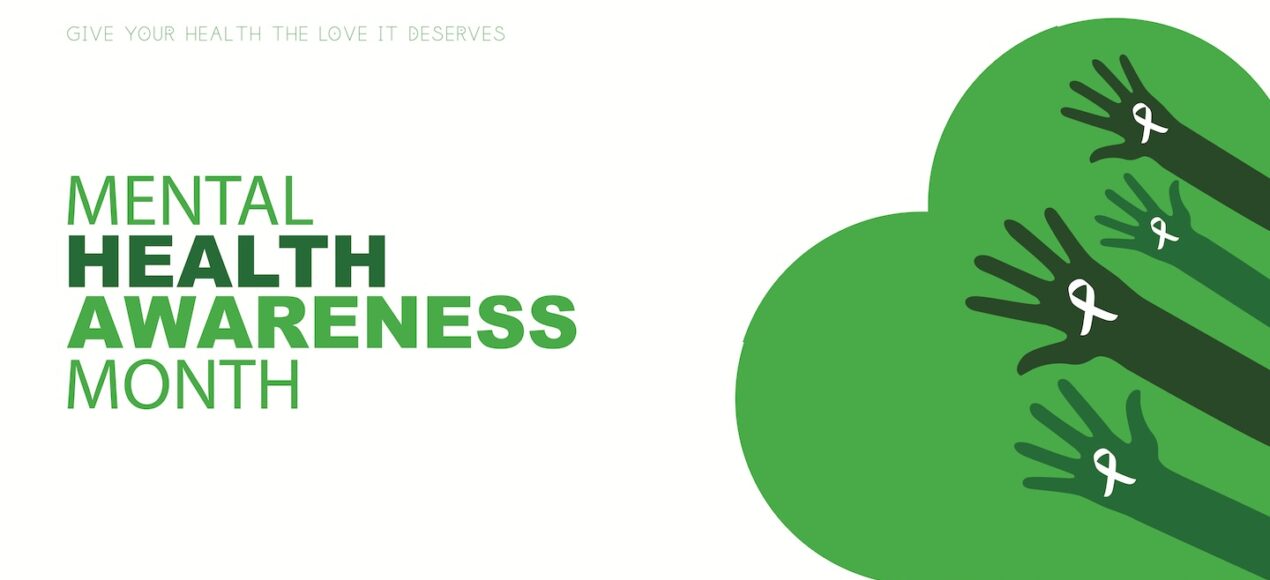Hope’s Destiny in Horsham, PA, offers evidence-based outpatient care for mental health and co-occurring disorders, empowering lasting change through compassionate treatment.

May 13, 2024
Mental Health Awareness Month emphasizes the importance of mental health and well-being.
This month is a reminder to advocate for mental health awareness, understanding, and treatment to inspire positive change for yourself, your loved ones, and your community.
Read on to learn more about Mental Health Awareness Month and how each action you take — no matter how small — is a testament to the power of collective awareness and support.
Every May, Mental Health Awareness Month (MHAM) emerges as a symbol of hope, a call for understanding, and a platform for change.
Established in 1949 by Mental Health America (MHA), this month-long observance sheds light on mental health issues that often go unnoticed.
Its key messages focus on:
With the green ribbon as a symbol of hope and renewal, MHAM brings people together to fight against mental health stigma and create a future where everyone feels supported.
Throughout May, various mental health providers organize events and activities to raise awareness about the importance of mental health support systems.
This allows individuals, groups, and communities of diverse backgrounds to come together and talk openly about mental health.
Mental Health Awareness Month offers you the opportunity to discuss mental health conditions and share helpful information about the importance of mental health care with your community.
Even small actions can have a significant impact on raising awareness and promoting mental wellness.
Here are eight practical ways you can contribute to Mental Health Awareness Month in 2024:
Sharing mental health information is a powerful way to raise awareness and educate others.
You can do this by using social media platforms to post informative articles, graphics, and statistics related to mental health.
Also, consider sharing resources with your loved ones through direct messages or texts. This ensures that the information reaches those who may need it most.
Remember, credibility matters. Stick to research-backed information from credible sources, like the Substance Abuse and Mental Health Services Administration (SAMHSA), which provides downloadable resources for each week of the month.
Mental health problems can affect people from all walks of life. That’s why understanding the challenges different groups may face is essential for creating inclusive support networks.
Older adults, young people, veterans, caregivers, parents, and many more groups may experience distinct mental health issues. This can be often influenced by societal expectations, life transitions, or past experiences.
That’s why raising awareness about these issues during Mental Health Month can highlight the diverse nature of mental illness. It opens the door to meaningful conversations and advocacy efforts for change.
Starting conversations about mental health with your family members, friends, and online communities can build awareness and challenge mental health stigma.
Knowledge is power, but people can’t offer support if they’re not aware of the struggles others may be facing.
By openly discussing mental health, you can normalize the conversation and create a supportive environment where people feel comfortable sharing their experiences.
These conversations not only provide a platform for support but also contribute to building empathy, understanding, and a sense of community around mental and behavioral health.
Stigma about mental health can sound like language that invalidates, silences, or perpetuates negative stereotypes about people who face mental health challenges.
Examples of this can include:
Be mindful of the words you use and how they may affect others’ perceptions of mental health.
By consciously choosing your words and fostering respectful dialogue, you can reduce stigma and create a more supportive environment for everyone.
Here are examples of how you can challenge those stigmas:
You can support the initiatives of MHAM by directly helping mental health organizations.
Your help can look like:
Whether you or a loved one are struggling with substance use disorders, mental illnesses, or co-occurring disorders, various organizations are here to help.
Some include:
If you know someone who may be struggling with mental health issues, reaching out with empathy and understanding can make a world of difference.
Look out for signs like:
Simply letting them know you’re there to listen, validate their feelings, and support them can be a lifeline during challenging times.
You can also encourage them to seek help from reputable and compassionate mental health professionals or offer to contact someone for them if they are open to it.
Supporting someone who needs mental health help can make a difference in their lives.
This could look like:
Yet, when offering this support, remember to set boundaries and avoid enabling or harmful behaviors. You can be there for someone while encouraging them to take proactive steps toward their own well-being.
Remember, it’s okay to seek guidance from professionals or support groups if you’re unsure how to best help someone in crisis.
While supporting others is important, it’s equally important to prioritize your own mental health.
Here are ways you can do that:
Taking care of yourself allows you to be in a better position to offer support to others.
Unrecognized and untreated mental health conditions can have significant impacts on the people facing them and society as a whole. This is what makes the mission of MHAM so important.
Examples of this impact include:
Two major shifts are needed to help drive change in the mental health crisis and support. These include:
If you or a loved one are battling mental illness, you’re not alone.
At Hope’s Destiny, we offer compassionate, evidence-based mental health treatments in a safe and welcoming environment.
Whether you need peer support, one-on-one help, family support, or more, we’re here to help you toward a brighter and more fulfilling future.
With services offered in both English and Spanish, you can be sure to get the culturally inclusive care you need.
Contact us today to start your recovery journey.

At Hope’s Destiny, we know that seeking help takes courage, and we’re ready to walk beside you every step of the way. Our personalized, evidence-based programs provide the support you or your loved one needs to build a stronger tomorrow because everyone deserves a chance to write their own story of recovery.
Copyright © 2025 Hope’s Destiny | All Rights Reserved | PRIVACY POLICY